Stolen Future: Part 6
'You can't love the disease away'
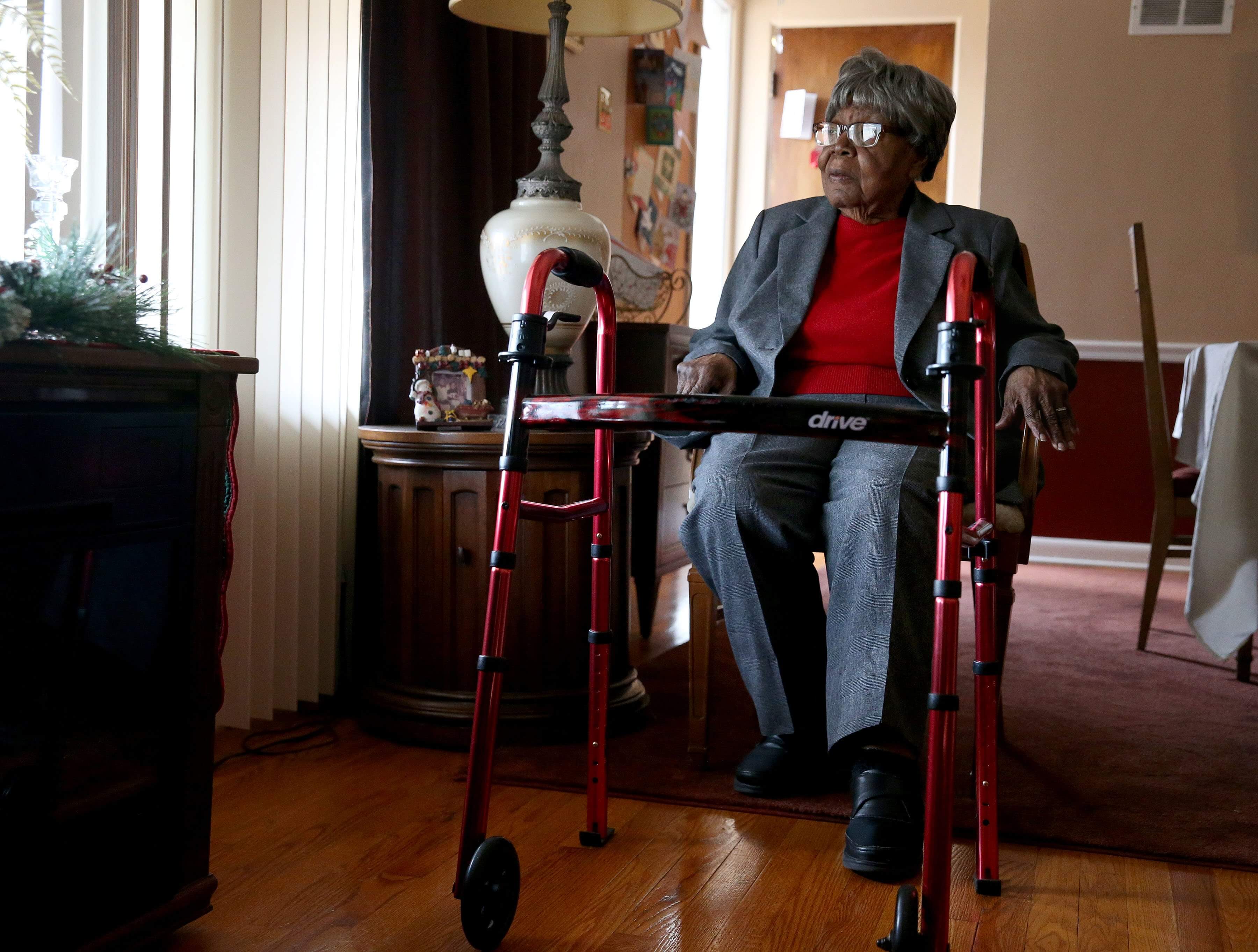
Barbara Lewis rests a moment in her University City home on Wednesday, Dec. 19, 2018. Lewis, 88, learned from her doctor two years ago that she has dementia. She has an appointment with a neurologist next month for testing to determine the cause. Christian Gooden / St. Louis Post-Dispatch
Barbara Lewis
Age
88
Lives in
University City
Condition
Dementia
Barbara Lewis has always worked. She has prepared hot meals at a Veterans Administration hospital, checked out customers at five and dime stores, sold items in nearly every department at Sears, catered meals and cleaned St. Louis County libraries. She is a mom of five.
She loves her church, West Side Missionary Baptist Church, which she has attended since she was born.
About four years ago, the church sermons became too hard for her to follow. She would leave peaches out of her peach pies. She thought her family was moving her things. Two years ago, she was diagnosed with dementia.
Lewis' husband died in 1982. Her daughter, Rosalyn Stiles, has lived with her in her longtime University City home since Stiles' husband died 11 years ago.
Lewis has three daughters who live in the St. Louis area, and they try to keep her as active and happy as possible. With endless patience, they play card games with her, include her in decorating projects and visit with pets and grandchildren. Lewis also visits a senior center three mornings a week.
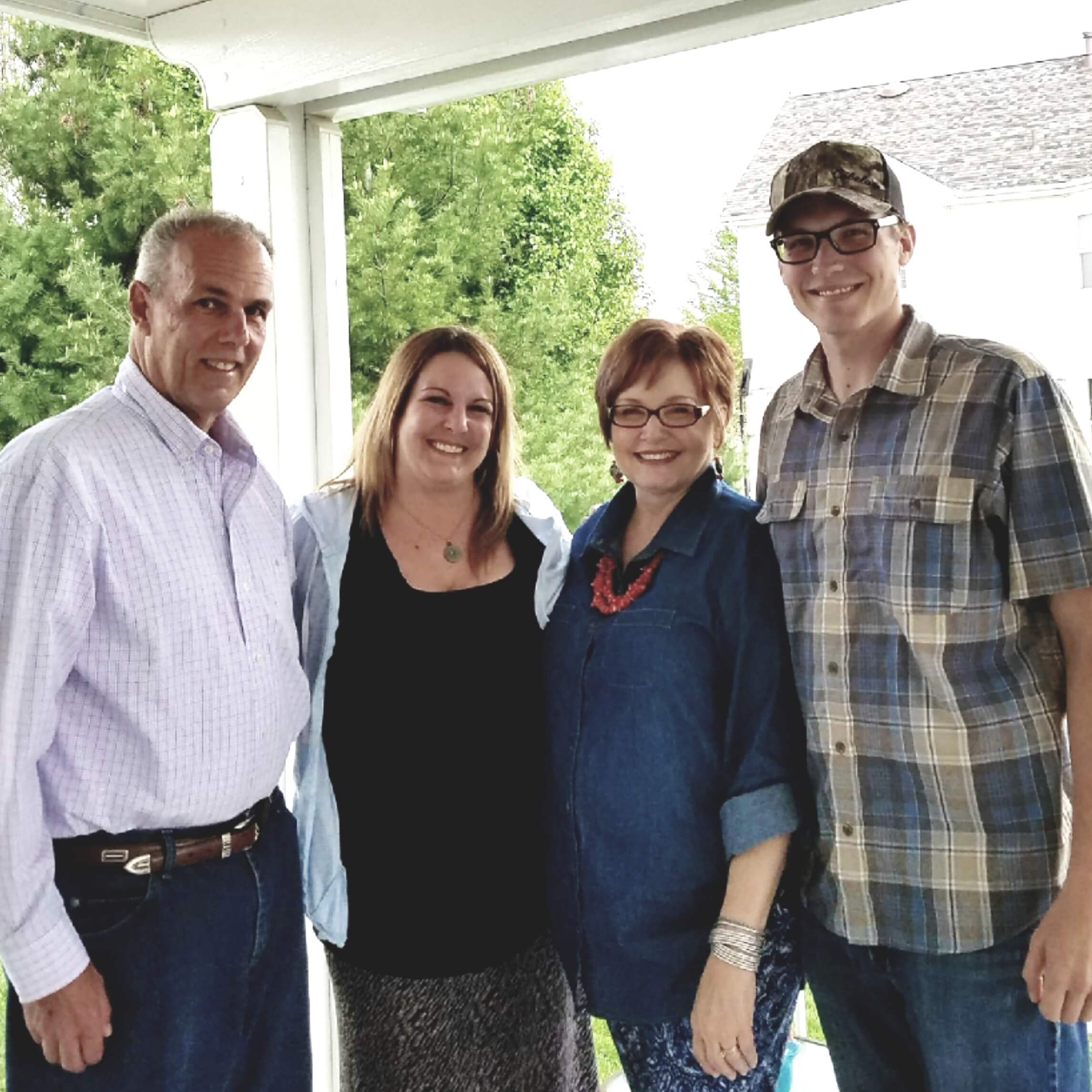
Brad Wetter with his family. His wife says the photo was taken around 2016. From left are Brad Wetter, daughter Melanie Wetter, wife Miriam Wetter and son Jonathan Wetter. Photo courtesy of the Wetter family.
Brad Wetter
Age
64
Lived in
St. Charles
Condition
Alzheimer's
Died
Oct. 16, 2017
Brad Wetter worked as a meat cutter before becoming office manager for Moore Oil Co. in St. Charles. He hunted and fished and was active in the Jaycees.
One day, at age 56, his wife, Miriam Wetter, wrote, he repeated something to a group of friends. "That may not be strange to anyone, but he said it in a way that sounded like the first time he said it. The statement was brand new to him!"
Another sign of problems came in the checkbook, which Brad took care of. "One day I looked at it and could not believe my eyes. Brad had numbers and words randomly written on every line in the register. It took me several days to straighten it out," she wrote.
Brad and his wife began looking for a diagnosis, what she called "a game of ruling everything else out."
"Physicals, CT scans, blood work of every type, mental testing and even a lumbar puncture. We went to his primary doctor, a neurologist, a psychologist and a psychiatrist over a two-year span. We ended at Wash U. where he was determined, at the age of 58, to have a memory disorder of unknown etiology."
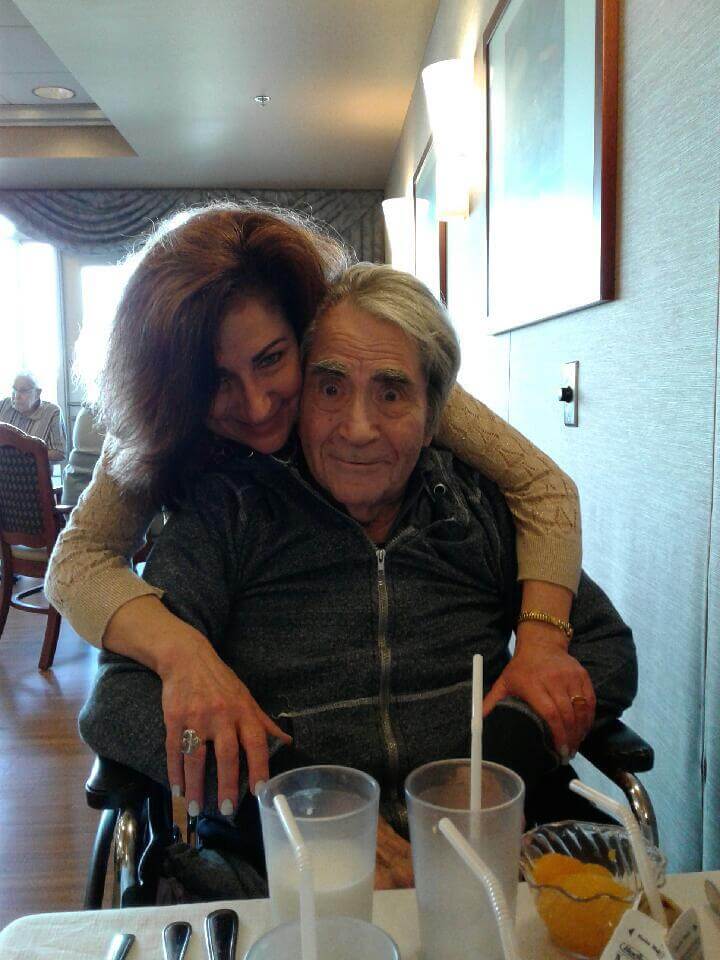
David Geffen with his daughter, Lisbeth Lang. He started showing signs of dementia at age 81 after heart surgery and died in September 2018 at age 89. Photo courtesy of the Geffen family.
David Geffen
Age
89
Lived in
St. Louis
Condition
Dementia
Died
Sept. 2, 2018
David Geffen worked in managerial jobs at IBM and McDonnell Douglas, worked in computer fields and was a professional musician.
At age 81, after quadruple bypass surgery, his daughter, Lisbeth Lang, says she noticed "extreme changes" in his personality. He "became very resentful and angry, then very self-absorbed talking constantly about himself, forgetting emails he had already sent, hoarding, not bathing or changing clothes, obsessed with flashlights and having enough of them, forgetting we were going somewhere, certain he could win the sweepstakes that were always in his mail," Lang wrote.
He had bought into a facility in Arizona that started with independent living and offered more care as needed.
Lang said she doesn't know what kind of dementia her father had. In 2015, he was moved into an advanced Alzheimer's unit. He had a stroke and died four days later, on Sept. 2, at age 89.
Lang says families who suspect issues need to get their loved one tested.
When dealing with a loved one with dementia, her advice was: "Always humor them, never force or insist anything on them … Ask them what they need or would like, ask if they are comfortable, hold their hand, be patient and kind, spend as much time as possible with them, keep a sense of humor, if they have a religion take them to church regularly, if they are musical make sure they continue to play their instruments and stay active in what interests them, listen to music with them, don't take the disease personally."
She said it's important that a close, trustworthy family member have medical power of attorney, and families should retain "an excellent elder law attorney."
"You have to be even more prepared than you think," she said.
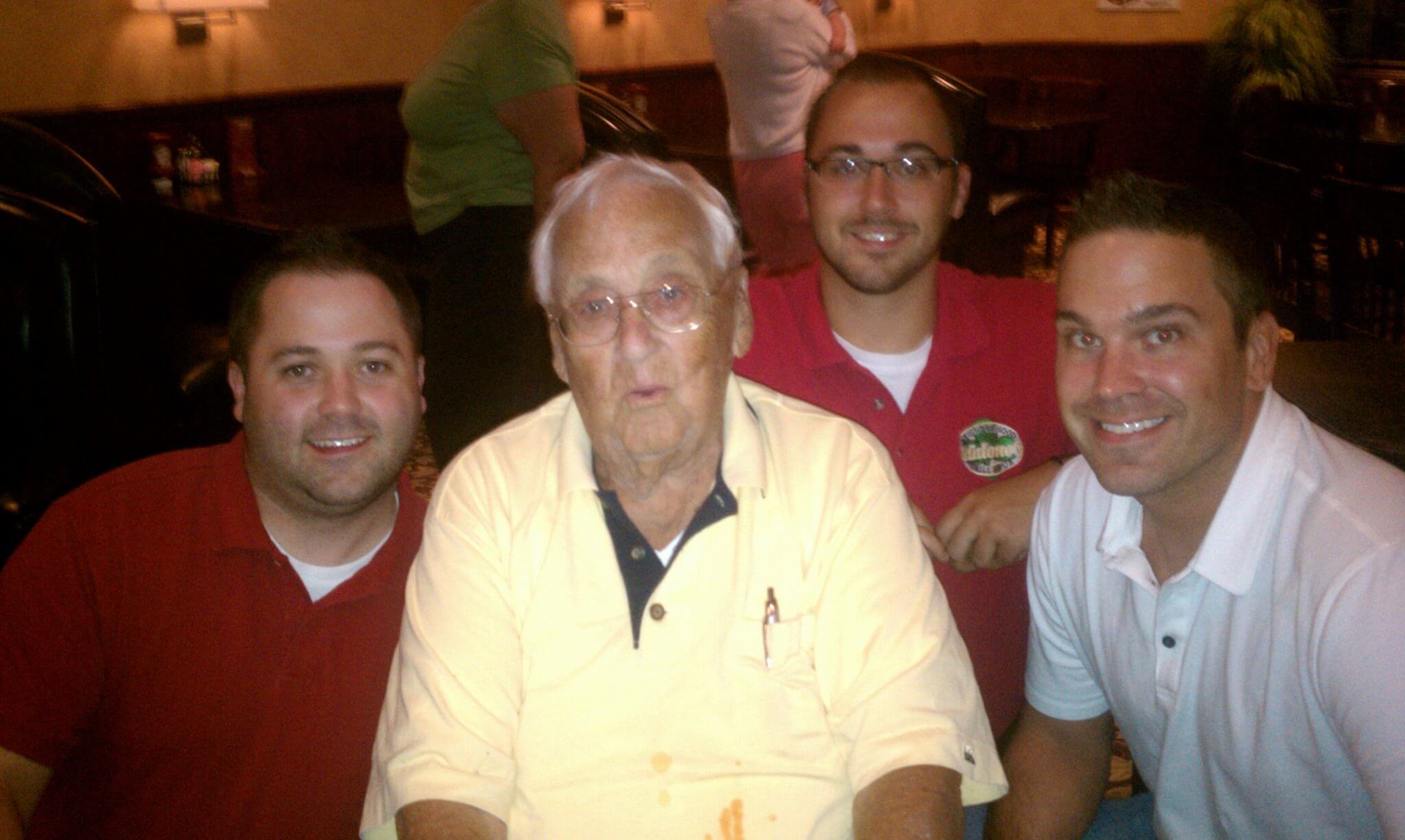
Jim Boergadine was diagnosed with Alzheimer's in 2002. He is pictured with his grandsons, from left, Michael McDermott, Ryan McDermott and Matt Wolf. Photo courtesy of the Boergadine family.
Jim Boergadine
Age
89
Lived in
Affton
Condition
Alzheimer's
Died
2011
"The first signs of problems came when Jim Boergadine kept repeating stories. Then he started chanting, "Right here. Right here." "He didn't even know he was saying it," his daughter, Jan Boergadine, said.
He worked as a sales rep for GM ACDelco Division. He loved doing crossword puzzles, but got so he couldn't do them anymore. And he was an avid reader, but after a while "couldn't follow the plot," his daughter said.
In 2002, his doctor sent him to see a neurologist, and he was diagnosed with Alzheimer's. Not long after that, he moved in with Jan. (His wife died in 1995.)
Until their father died, Jan, her brother, Tom, and sister, Peggy McDermott, worked together to care for him. Tom would take him to dinner and Peggy to appointments.
Jan's most important advice for caregivers: "Don't disagree or argue with your loved one. You don't need to prove you're smarter and they're wrong. If they say the grass is purple, agree with them. Have patience."
She said one of the most difficult things was seeing her father forget her mother. "That was sad," she said.
But not all Alzheimer's stories are sad, she said. She shared this one:
"One time my dad went for his regular appointment with the neurologist. The doctor began the appointment by asking my dad to name three objects that the doctor held up: a pen, coffee mug and watch. After correctly naming the three objects, my dad turned to my sister and told her they needed to find a new doctor. 'Why do you want a new doctor?' she asked. My dad replied, 'This guy doesn't know what anything is!'"
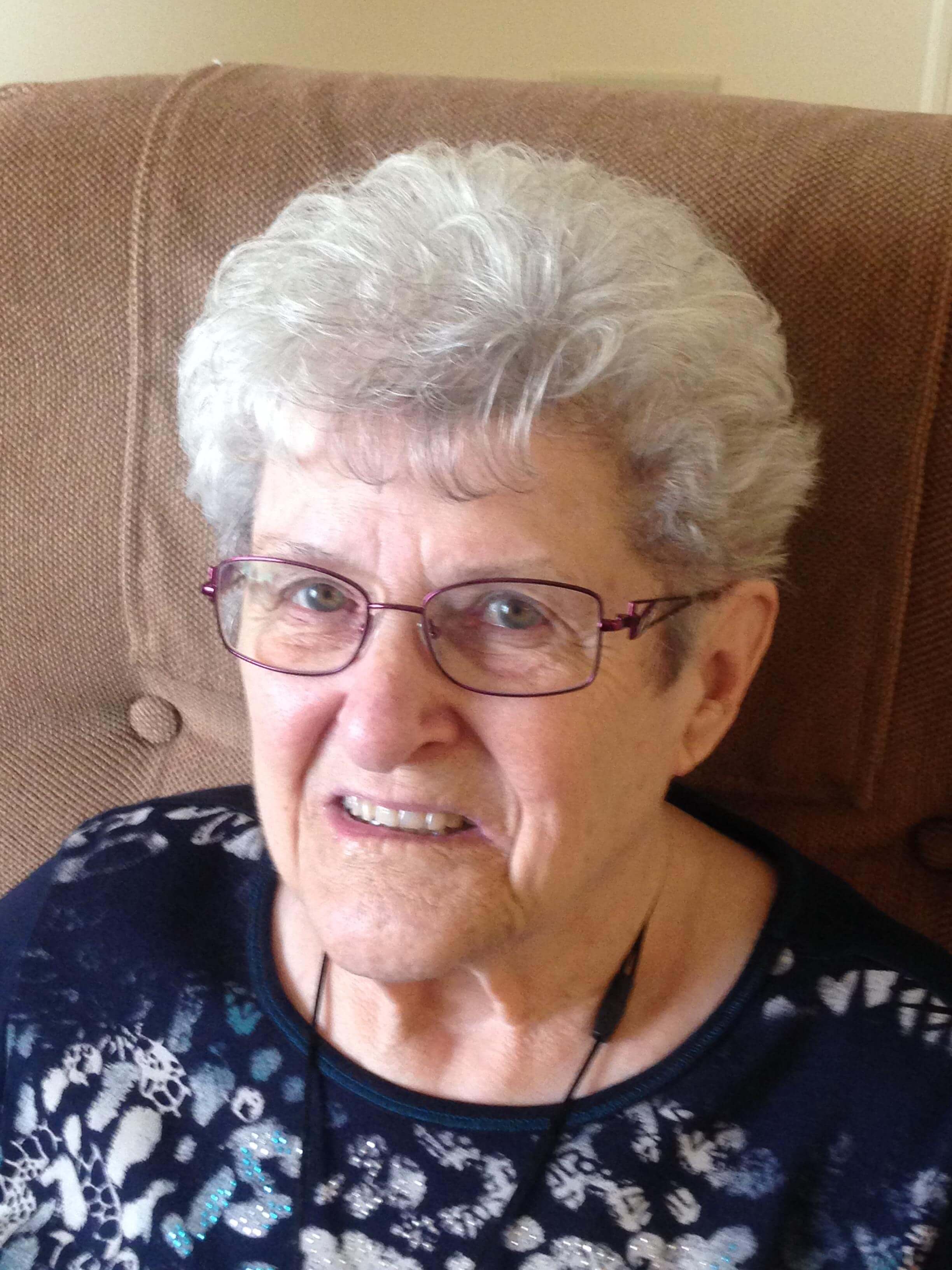
Joann Handte was the caregiver for her husband after he suffered a stroke. Then she developed dementia and needed help herself. Photo courtesy of the Handte family.
Joann Handte
Age
83
Lived in
St. Louis
Condition
Vascular dementia
Died
April 19, 2018
Joann Handte couldn't figure out how to use her cellphone, her daughter, Diana Morrison, said, even though she had been using one. So the family bought her an old-fashioned land line phone. But she couldn't figure out how to use it either.
Her personality began to change. She got a lot quieter and began falling frequently.
Handte was the caregiver for her husband, who had suffered a stroke. They were living in an independent assisted living facility. In January 2017, at the age of 82, Handte was diagnosed with vascular dementia.
Because she needed more help, Morrison said, she was moved into a long-term care facility in May 2017. After three weeks, they realized she needed to be in a memory unit.
Morrison said that her mother fell a lot because she could not remember that she could not walk.
Handte died April 19.
Her mom worked at Schnucks as a checker and head cashier, Morrison said. Her hobbies were her four daughters.
Her advice for families:"Every single case is different. Be patient with your loved one. Be their advocate."
Despite the changes in her mother's condition, Morrison said, "Her face still lit up when I came in the room. I think she still knew who I was."
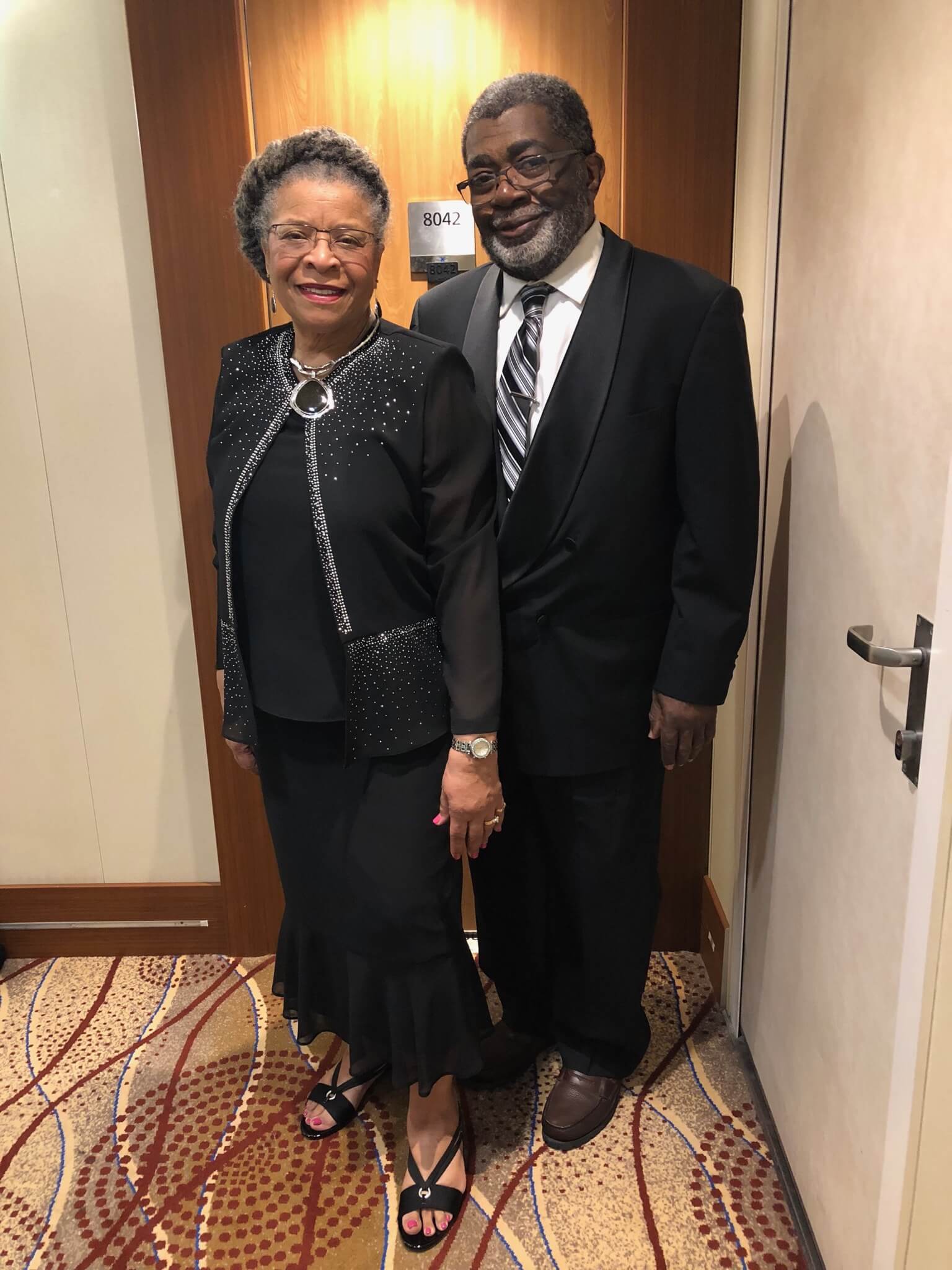
Joe Simmons started having memory problems years ago. He has vascular and frontotemporal dementia. His wife, Teresia, has helped organize a support group for spouses. Photo courtesy of the Simmons family.
Joe Simmons
Age
70
Lives in
Pasadena Hills
Condition
Vascular and frontotemporal dementia
Joe Simmons was diagnosed six years ago, soon after he collapsed and doctors realized he had suffered a series of mini strokes, said his wife, Teresia Simmons.
The two married 18 years ago, both on their second marriage. They met while snow skiing in West Virginia. Teresia Simmons retired as a teacher in Ohio and joined Joe in the St. Louis area.
Ten years into their marriage, he started having symptoms. He was unable to balance his checkbook despite his career in finance working for the St. Louis branches of the Federal Reserve and Internal Revenue Service. He became quiet and agitated. He didn't want to go out.
“He always called himself the absent-minded professor,” Teresia Simmons said.
When he was diagnosed, they tried to make the most of their time together. They went on several cruises, hiked area parks, visited museums and took art classes. It was a major undertaking, but the last trip they took together was in June to New York City, to see where Teresia sang with her choir at Carnegie Hall.
Over two months ago, Joe moved into a memory care home. He was constantly trying to wander away. He would get combative with any sort of change — bathing, brushing his teeth or putting on deodorant. “He didn't want to do anything but wear the same thing over and over,” his wife said.
He was agreeable to moving, however. “He knew what it was doing to me,” she said. “Somewhere, he knew.”
Teresia Simmons says many African-Americans tend to try to deal with the disease on their own.
“We are so proud, we are so strong, we can do it by ourselves — wrong answer,” she said. “We are not taking advantage of the resources that are available to us.”
She worked with other black spouses to start a support group that meets from 10 to 11:30 a.m. the third Saturday of each month at the Friendly Village senior living apartments, 5545 Wells Avenue.
“You can't do it alone without help. It will kill you. It will kill your spirit. It will kill you physically. It will destroy you,” she said. “No matter how much you love them, you can't love the disease away.”
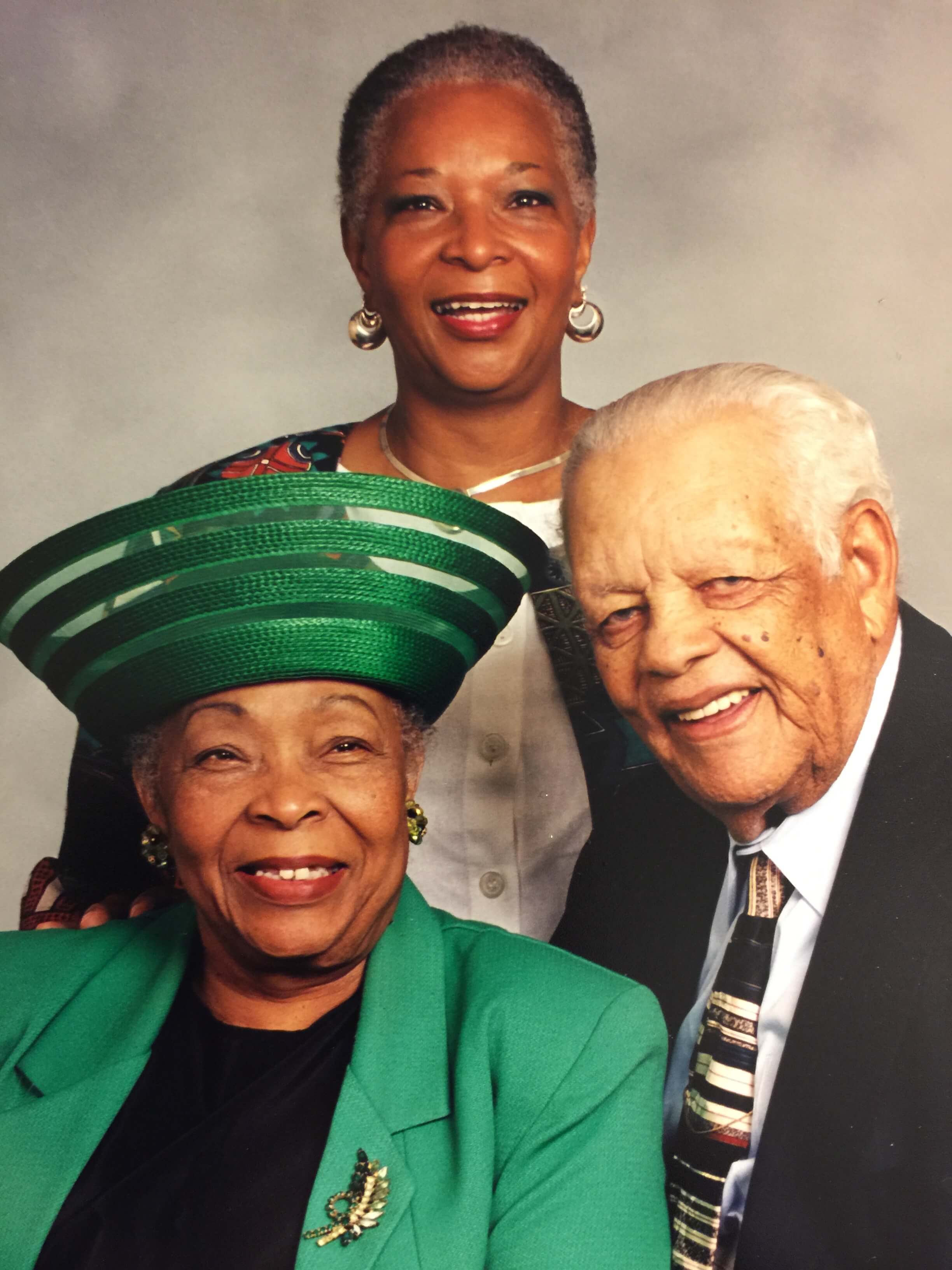
Leola Ross, seated at left, had Alzheimer's disease. She is pictured with her husband, Joe Ross, and daughter Beverley Foster. Photo courtesy of the Ross family.
Leola Ross
Age
78
Lived in
Kansas City
Condition
Alzheimer's
Died
2006
"Sewing and singing were her mother's passions, said Beverley Foster, of St. Louis. Her mom, Leola Ross, was a stay-at-home mother who helped support her family through her sewing and was a soloist in her church choir.
She was in her late 60s when she started showing signs of dementia. She forgot where she put things and said people were stealing them. She couldn't thread her sewing machine or place a pattern.
"She was aware that something was wrong but couldn't recall words to complete what she wanted to say," Foster wrote. "I remember one time when unable to get words out she said, 'I hate this, I hate this.'"
When her mother needed more care, Foster's sister moved to Kansas City and became a full-time caregiver. Their mom was able to live at home until she died. Their father died about a month after her mom.
Foster advised taking advantage of organizations that are available to help and consider participating in research studies and organ donation.
"This disease is difficult for everybody," Foster wrote. "Caregivers and patients must be cared for. Do things that make you laugh, play and make happy times and new memories in the meantime."
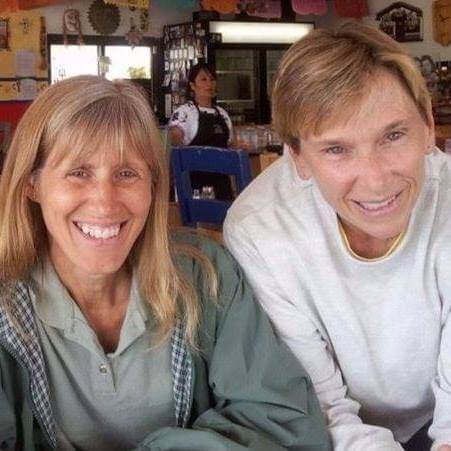
Linda Fiore, at left, first started having problems at age 53. It took five years before she was diagnosed with frontotemporal dementia. She and Cynthia Hickman, right, have been together 32 years and married for five. Now Hickman is a caregiver for Fiore. Photo courtesy of the Fiore family.
Linda Fiore
Age
57
Lives in
Moro
Condition
Frontotemporal dementia
Linda Fiore and and Cynthia Hickman have been partners for 32 years, married for five. In retirement, they had hoped to travel together and take care of their small 4-acre farm and produce stand.
Fiore worked as the administrative assistant to the principal at Edwardsville High School after leaving the same position at Mary Institute and St. Louis Country Day School in Ladue, Hickman said.
Every morning, Fiore had to give the Pledge of Allegiance over the intercom. About four years ago, she couldn't remember the word “indivisible.""
Next came leaving out prepositions and having trouble calculating numbers. Hickman said. Fiore's primary care doctor thought the symptoms might be caused by menopause. Fiore was 53 at the time.
Her reading, writing and language worsened, however. The doctor ordered a CT scan, which can detect things such as stroke or a tumor, but the test came back negative. Fiore struggled with impulsive behavior, mainly overeating.
They sought further tests from specialists — and 15 months after Fiore's first symptoms, she was given a detailed diagnosis of behavioral variant frontotemporal degeneration and primary progressive aphasia.
“Be aggressive in your pursuit of an accurate diagnosis,” Hickman said. “Many insurance companies are reluctant to pay for MRIs and PET scans, so you have to be insistent.” An accurate diagnosis is important, she said, in knowing how to manage care, prescriptions and plan for the future.
Fiore can no longer talk. Her body is rigid, and she is unable to move. Hickman was working a part-time job after retiring from General Motors but had to quit to become a full-time caregiver. A home health aide helps.
“She's very debilitated. It's very physically challenging,” Hickman said. “Though I do have a caregiver 30 hours a week, I'm restricted to home a lot, and I can't get out and do things.”
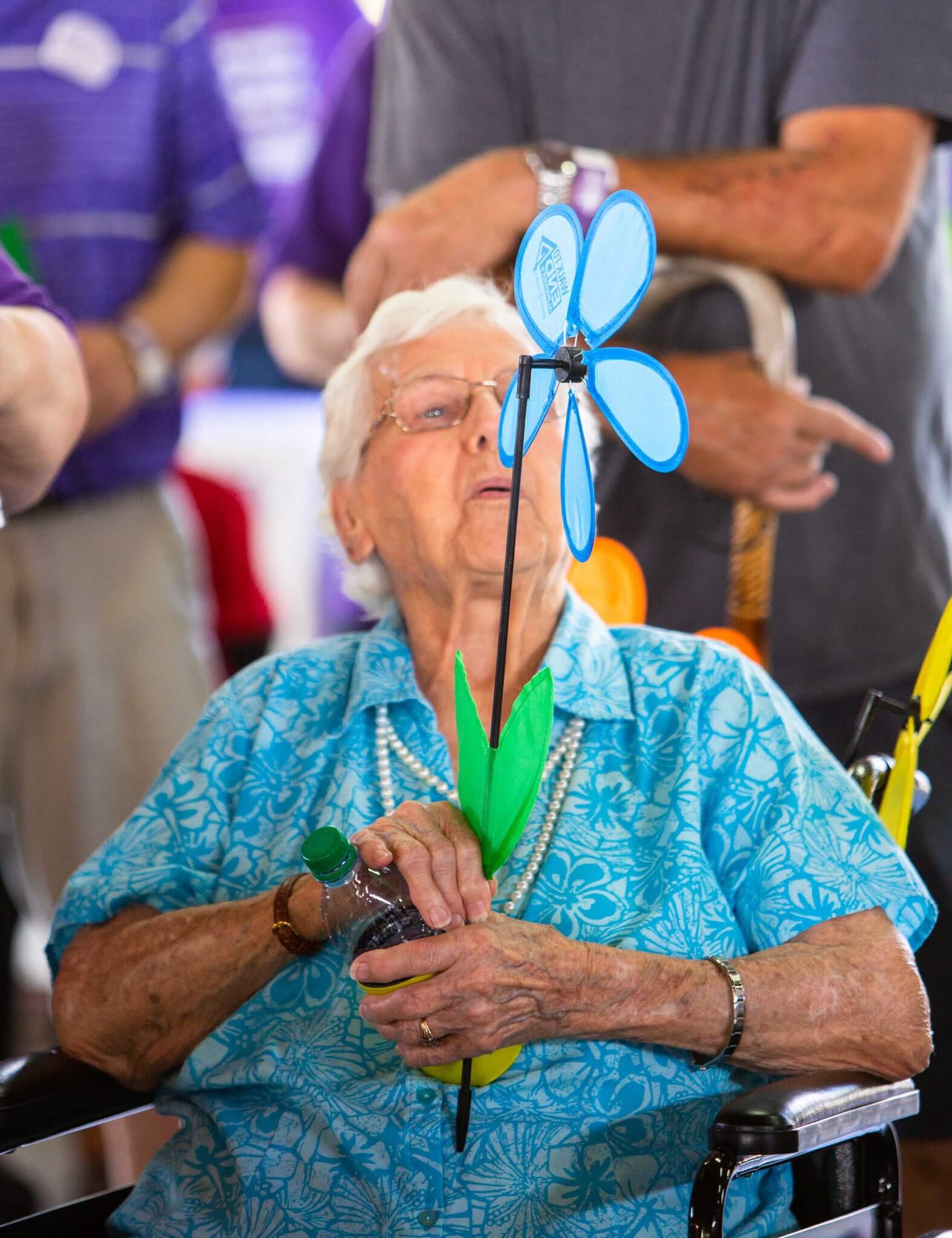
Marie Holtmeyer, 91, of Jefferson City holds a blue flower, a symbol that she has dementia, at an Alzheimer's walk earlier this year. She lives with her daughter and son-in law and was first diagnosed with dementia at age 84. Photo courtesy of the Holtmeyer family.
Marie L. Holtmeyer
Age
91
Lives in
Jefferson City
Condition
Alzheimer’s and vascular dementia
Susan Gilbert says her mother was meticulous with her checking account. "Everything had to be down to the penny." Then she started having problems figuring out the checkbook, started misplacing items, was depressed and crying. At first, her family thought it was loneliness, so they moved her from her farm in St. Elizabeth closer to family in Jefferson City. In 2010, she moved in with Gilbert and her husband.
Holtmeyer was diagnosed with Alzheimer's at age 84 in 2011. This year she was diagnosed with vascular dementia, Gilbert said.
She is 91 now, sleeps a lot and isn't eating much. But she likes to talk about her childhood along the Osage River, and is telling Gilbert stories that she has never heard before.
Holtmeyer had 15 children and worked on the farm, raising chickens, milking cows, gardening and canning. When her husband died in 1980, Holtmeyer still had three teenagers living at home, plus a soon-to-be married daughter.
"My mama is a fighter and will not give up on life if she can control it," Gilbert wrote.
She advises family members of dementia patients to join a support group to learn from other caregivers and to read as much as possible. "Each person has their own ways of dealing with this diagnosis and should do whatever is best for them," she wrote.
Being a caregiver for her mother has brought new challenges. "I learned as time went by. I’ve gotten to know her as a different person than just my mama, of whom she is as a sweet, caring, wonderful person she is. We’ve had many laughs and happy times, and (I) wouldn’t change anything in the time I’ve had with her."
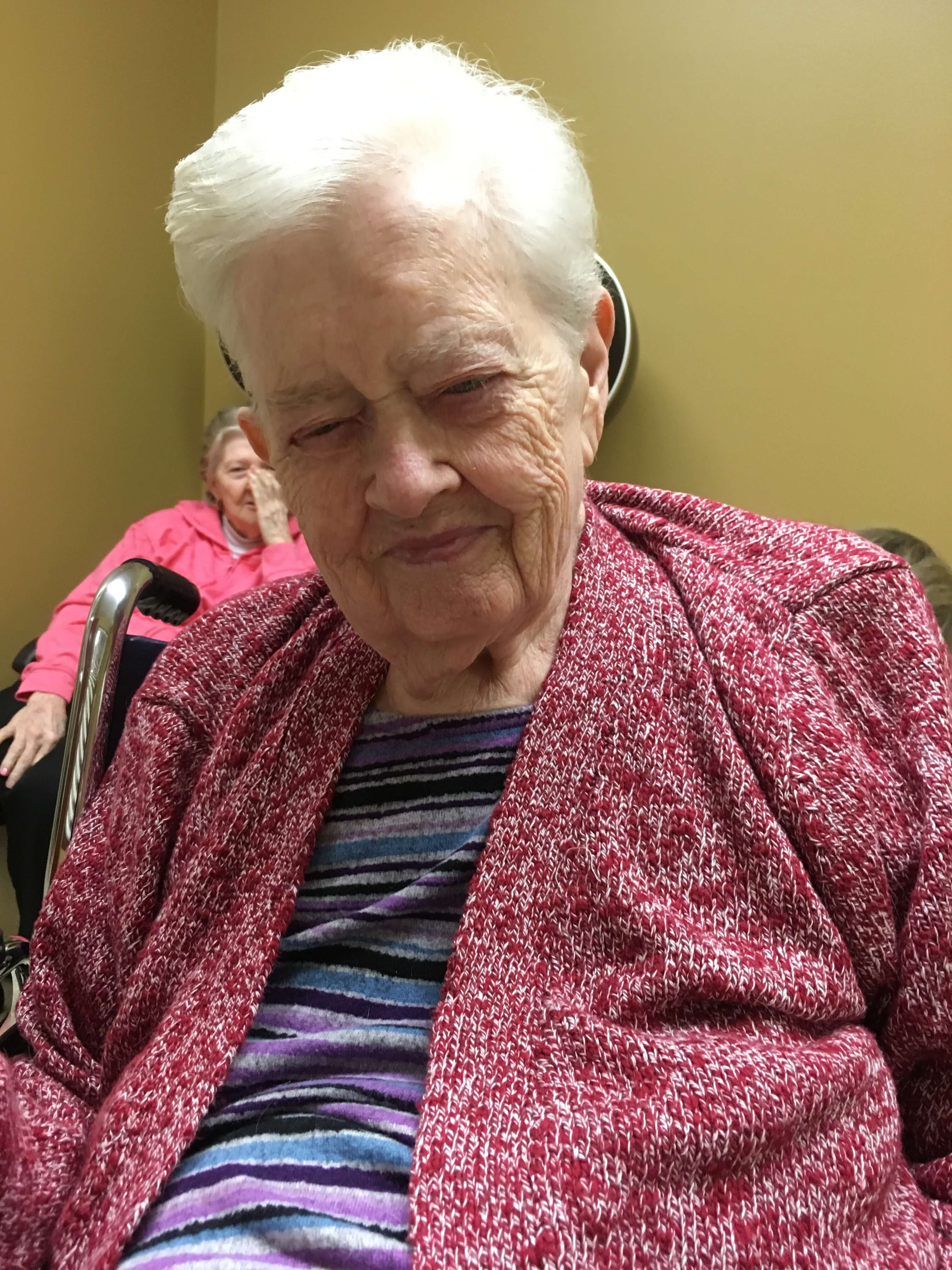
Marilyn Bigelow, 81, of St. Louis, was diagnosed with Alzheimer's disease about eight years ago. She has needed skilled nursing care since April. Photo courtesy of the Bigelow family.
Marilyn Bigelow
Age
81
Lives in
St. Louis
Condition
Alzheimer's
Marilyn Bigelow was an elementary school teacher until she got married and had three children. She and her husband opened a bookstore in their small town in Massachusetts.
Bigelow eventually went back to teaching. She dedicated herself to civil service, getting elected to her city, county and school boards, according to her oldest daughter, Beth Lucero.
“She was a very outgoing and involved person,” Lucero said. After Bigelow's husband died, she got her own apartment in the St. Louis area to be near Lucero.
About eight years ago, Bigelow was getting confused while driving, forgetting her medications, neglecting her dog and crying a lot. Lucero discussed concerns with her mom's primary care doctor. He referred her to a specialist, who made the diagnosis.
“Go with your loved one to the doctor as soon as you start to suspect they might have Alzheimer's,” Lucero said. Get legal documents in order, she suggests, and add your name to his or her bank account so you can take care of bills when needed.
Bigelow moved into an assisted living facility four years ago. She's required skilled nursing since April. One of the hardest moments came over two years ago, Lucero said, when she had to take her mom's dog away.
“She blamed others for taking the dog,” her daughter said. “She knocked on doors saying, 'I hate you.'”
Bigelow is aggressive and tries to hit or bite her caretakers. She grinds her teeth. She doesn't recognize her children anymore.
Lucero said, “She would hate the person she's become.”
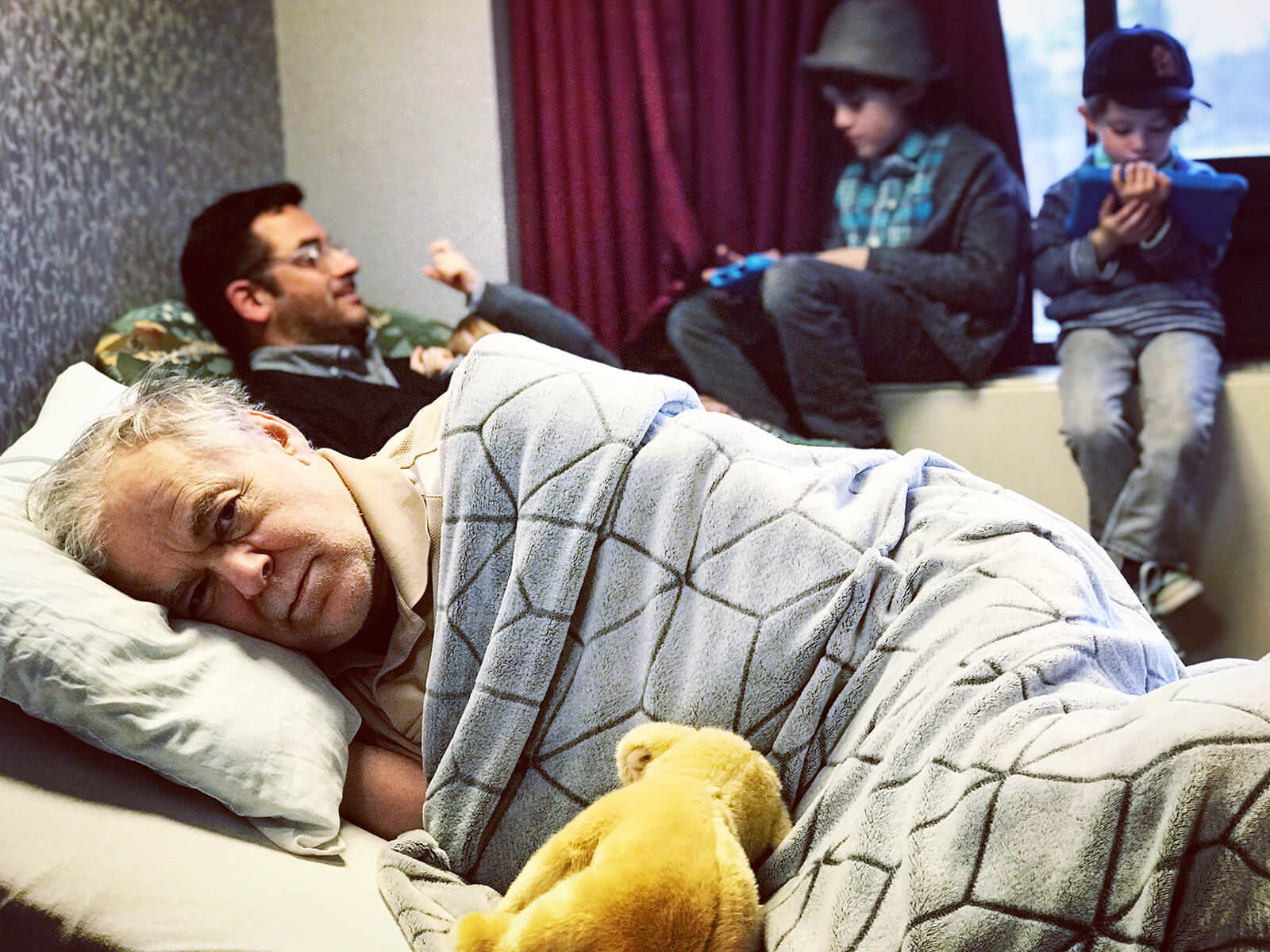
Mark Cendroski, who had frontotemporal dementia, moved into a skilled nursing facility at age 64. He died in June at age 68. His daughter has been documenting his years with dementia in a collection of photos she called "Living With a Ghost." Photo by Jamie Cendroski Vishwanat. Photo courtesy of the Cendroski family.
Mark Cendroski
Age
68
Lived in
St. Louis
Condition
Frontotemporal dementia
Died
June 4, 2018
Jamie Vishwanat said her dad, Mark Cendroski, started showing "very slight changes in behavior" around age 54 while working as an electrical engineer for Anheuser-Busch.
"He seemed to take on a more narcissistic demeanor and he suddenly seemed selfish, which was very unlike him," she wrote.
He seemed to lose his social filter, she wrote. "He became impulsive and obsessive. He would carry his 'boom box' everywhere and insist everyone listen to the music," she wrote.
"I think the final straw was when we met my parents for dinner to announce we were expecting our second child. My 2-year-old son made a sign that read, 'I'm going to be a big brother.' My mom immediately reacted. My dad did not. I knew then that something was seriously wrong and told my mom he needed to see a doctor."
Her father was diagnosed with frontotemporal dementia. "Finally, we had answers. But it was the beginning of an earth-shattering experience for our family," she wrote.
"Unbeknownst to my mom, or anyone else, my dad was spending his pension in excess. He stopped paying their taxes. We later learned he had spent nearly all of their retirement (funds). No one knew. Until it was too late."
She said her parents "were broke. And at the worst time, as now my dad needed 24/7 care. … After everything my dad had worked so hard to achieve, he ends up in a Medicaid bed of a nursing home."
"We must do something," Vishwanat wrote. "I’d be lying if I said it’s not a selfish plea as well. I’m 37, and have three little boys — and there’s not a day I don’t wonder if I’ll know when I begin to lose my mind."
Her advice to others:"If you have even the slightest suspicion your loved one may be showing early signs of dementia, see a doctor and make sure finances are in order. It's not 'just old age,' it's not having a bad week, it's not depression. Trust your gut and get it checked out."
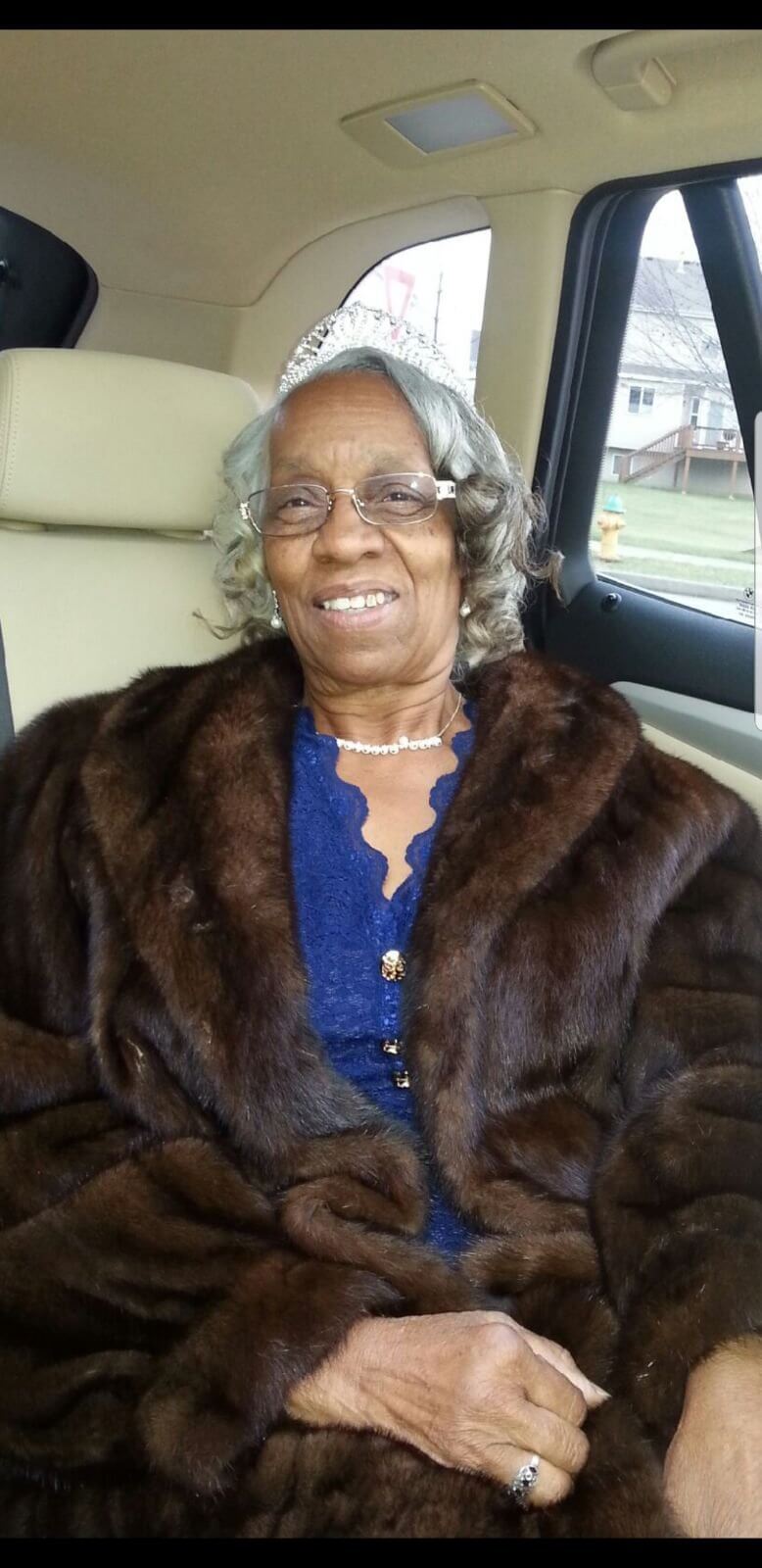
Maurice Ferguson, of St. Louis, who has Alzheimer's, lives with her daughter, Rosemary Bain-Walker and Bain-Walker's husband, Leonard. She was diagnosed after she ended up at a hospital one day and couldn't remember her name. Photo courtesy of the Ferguson family.
Maurice Ferguson
Age
81
Lives in
St. Louis
Condition
Alzheimer's
Maurice Ferguson's daughter, Rosemary Bain-Walker, says her mother — who had always been on top of everything — wasn't paying her bills reliably. And she had lots of bags of sugar because she would forget that she had already bought some.
One Sunday, Bain-Walker couldn't reach her mother before church. When she got to her mom's house, her mother was gone but there was a pot on the stove.
It wasn't until around 5 p.m. that Bain-Walker located her mother's car at Christian Hospital. She had come in and didn't remember her name. Doctors think she had a small stroke.
She was diagnosed with Alzheimer's after seeing a neurologist.
"I just thought she was getting old," Bain-Walker said.
Ferguson lives most of the time with Bain-Walker and her husband, Leonard. Her sister takes care of Ferguson when Bain-Walker is overloaded. And her mother goes to a day program. She likes to be busy, her daughter said.
Ferguson is her happy self during the day, Bain-Walker said, but she gets confused when the sun sets and talks about needing to put her children to bed.
Ferguson had seven kids and was a foster parent for more than 20 years, eventually adopting a family of four after her kids were all grown.
Bain-Walker advises families to pay attention to what's going on with their loved one and get them checked out when they see changes. Educate yourself on the disease, investigate what resources are available and ask a lot of questions.
"The main question is, 'Is there anything that will make a difference?' The answer is no. Some medications will slow it down but there is no magic pill."
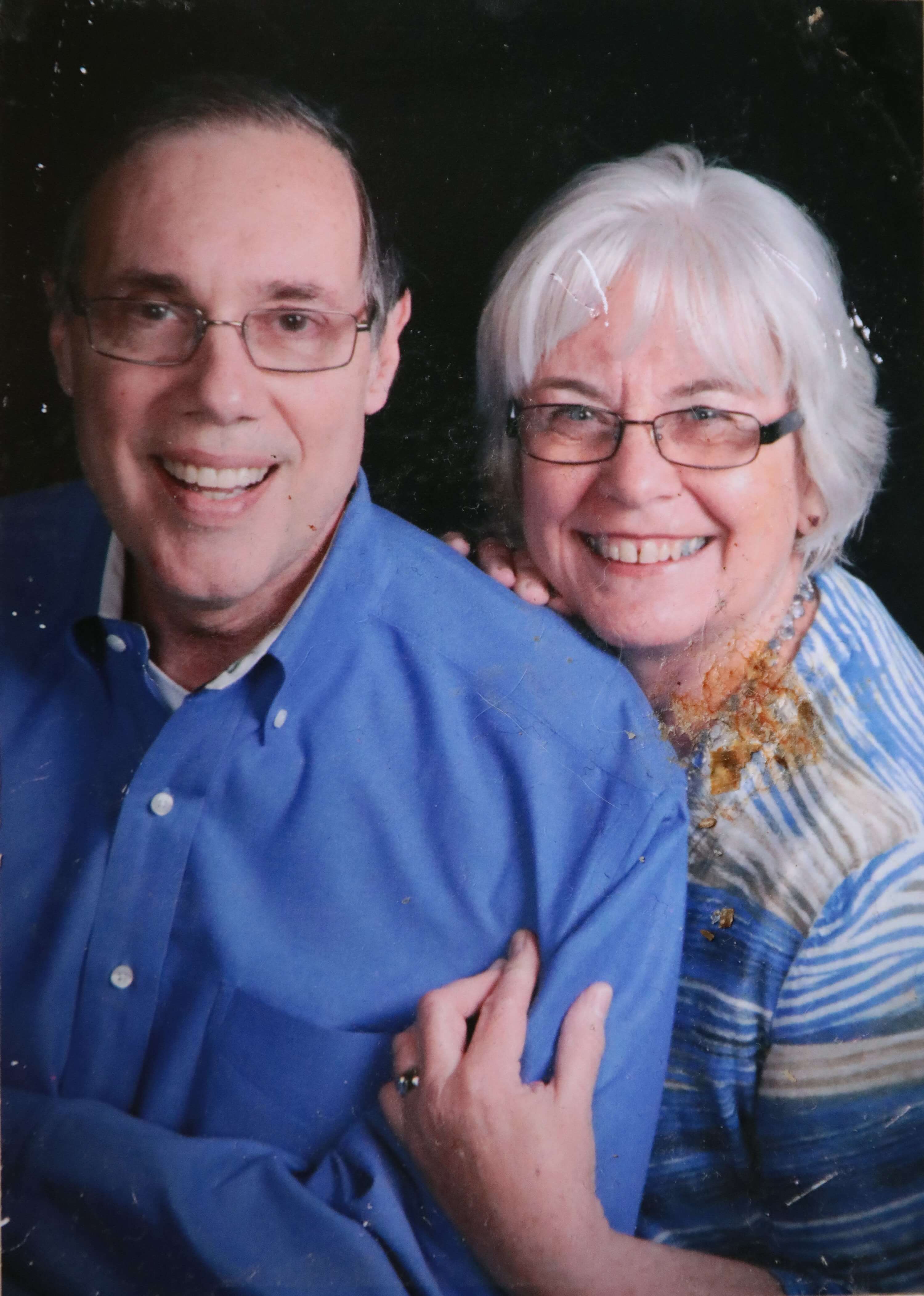
An undated photo of Ron and Mary Nicoletti as seen on Thursday, Dec. 13, 2018. Mary believes it was taken between 2012 and 2014. Ron was diagnosed with Alzheimer's eight years ago and the disease has progressed significantly. Two years ago, Mary had to place Ron in a facility when she could no longer care for him at home. Photo courtesy of the Nicoletti family.
Ron Nicoletti
Age
68
Lives in
Affton
Condition
Early onset Alzheimer's
Ron Nicoletti was diagnosed at the age of 60. At that age — under 65 — the disease is called “early onset."
Ron's wife, Mary Nicoletti, says symptoms began about four years earlier, but her husband was “a master at trying to keep things status quo” for her and their five sons.
She never knew the disease could strike at such an early age. The possibility that Ron could lose his job as the director of human resources for St. Louis Community College forced them to see a doctor.
Ron's disease was progressing quickly. Doctors suspected he had only a few years left to live. That was over eight years ago.
Two years ago, Mary had to place her husband of 45 years in a skilled nursing facility. She visits nearly every day, but he no longer knows her name.
Because of accounting mistakes before he was diagnosed, the Nicolettis lost their house in Sunset Hills. Mary is thankful Ron's brother let them live in his mom's house where they grew up in Affton. She continues to live there.
Mary tries to focus on that and other small blessings — the support from spouses like her she found through the Alzheimer's Association, the times when Ron grins or hugs her.
She wishes she had not spent so much time crying when he was first diagnosed.
“We wasted a lot of time feeling sorry for ourselves, instead of looking at it as time to spend together,” Mary said. “I was panicky. All I could think about was the outcome, and I couldn't enjoy the now.”
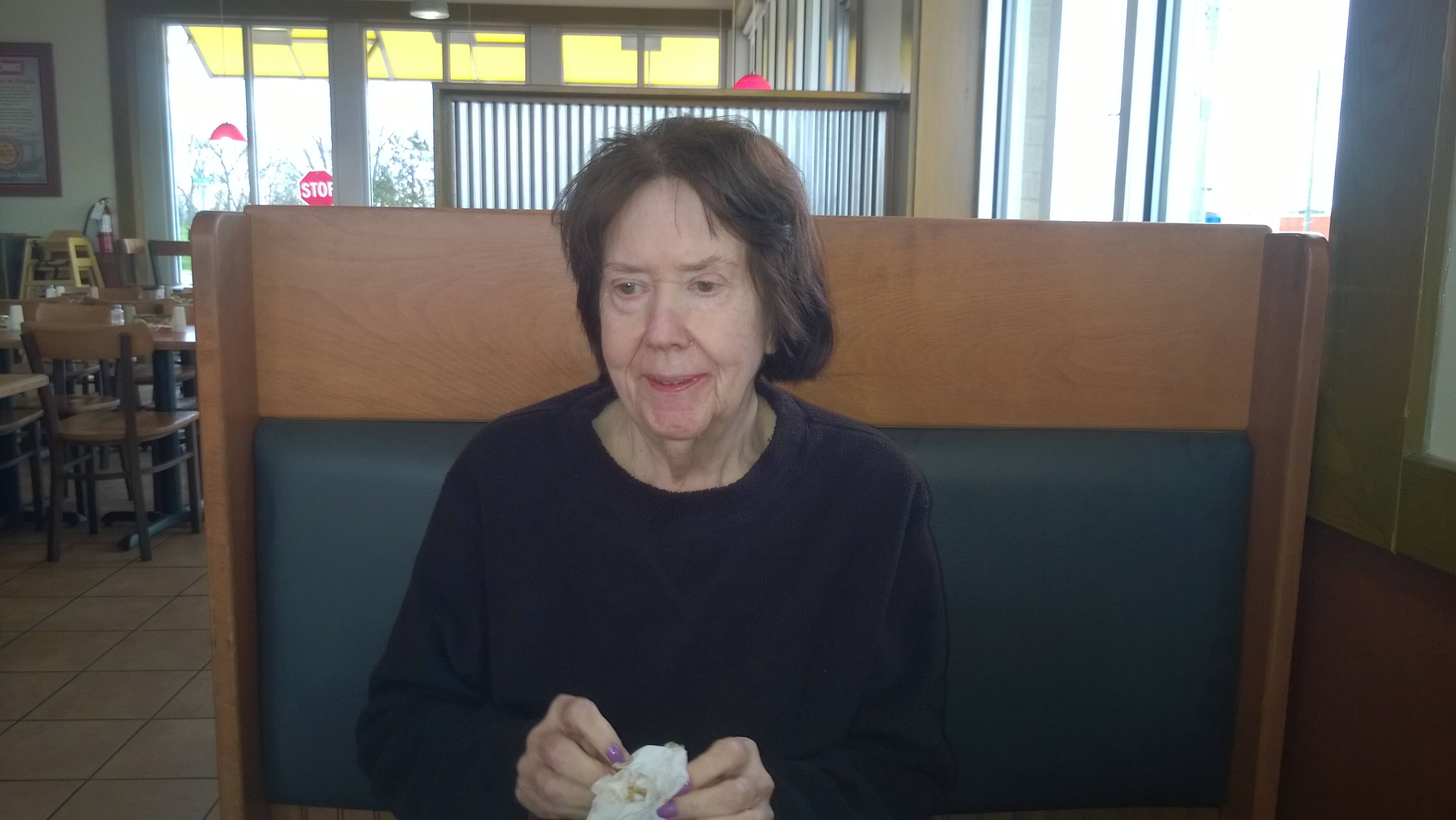
Ruth Forrest had an accounting degree and always kept meticulous records. Her friend Tammy Swinger said financial issues were a clue that Forrest had dementia. Photo courtesy of the Forrest family.
Ruth Forrest
Age
74
Lives in
Crestwood
Condition
Dementia
Ruth Forrest had a degree in accounting, and her banking records were always impeccable. "All of a sudden she's asking me for money," said her ex-sister-in-law Tammy Swinger. She said she believes Forrest was being scammed.
Swinger and Forrest remained close after Swinger's marriage ended, and Forrest also was close to Swinger's sons. "I talked to her every day," Swinger said.
Forrest was 69 or 70 before a doctor diagnosed her with dementia, but "we felt for a long time before that something was wrong," Swinger said. "I finally sat her down. She felt something was wrong, too."
The two started preparing documents needed to deal with Forrest's deterioration: a power of attorney and medical power of attorney.
Swinger advises caregivers to get the necessary legal help and find an attorney who specializes in elder law.
"Get control of their finances before someone takes advantage. Find good health care. Look at a nursing home that specializes in dementia and be involved."
More than three years ago, Forrest moved into a facility.
"She's not the same person, but one thing that hasn't changed — she is the sweetest person," Swinger said.
Forrest's brother, Swinger and Swinger's sons, who are close to Forrest, look out for her.
"She has blessed my life and she would do the exact same thing for me," Swinger said. "I know she would."
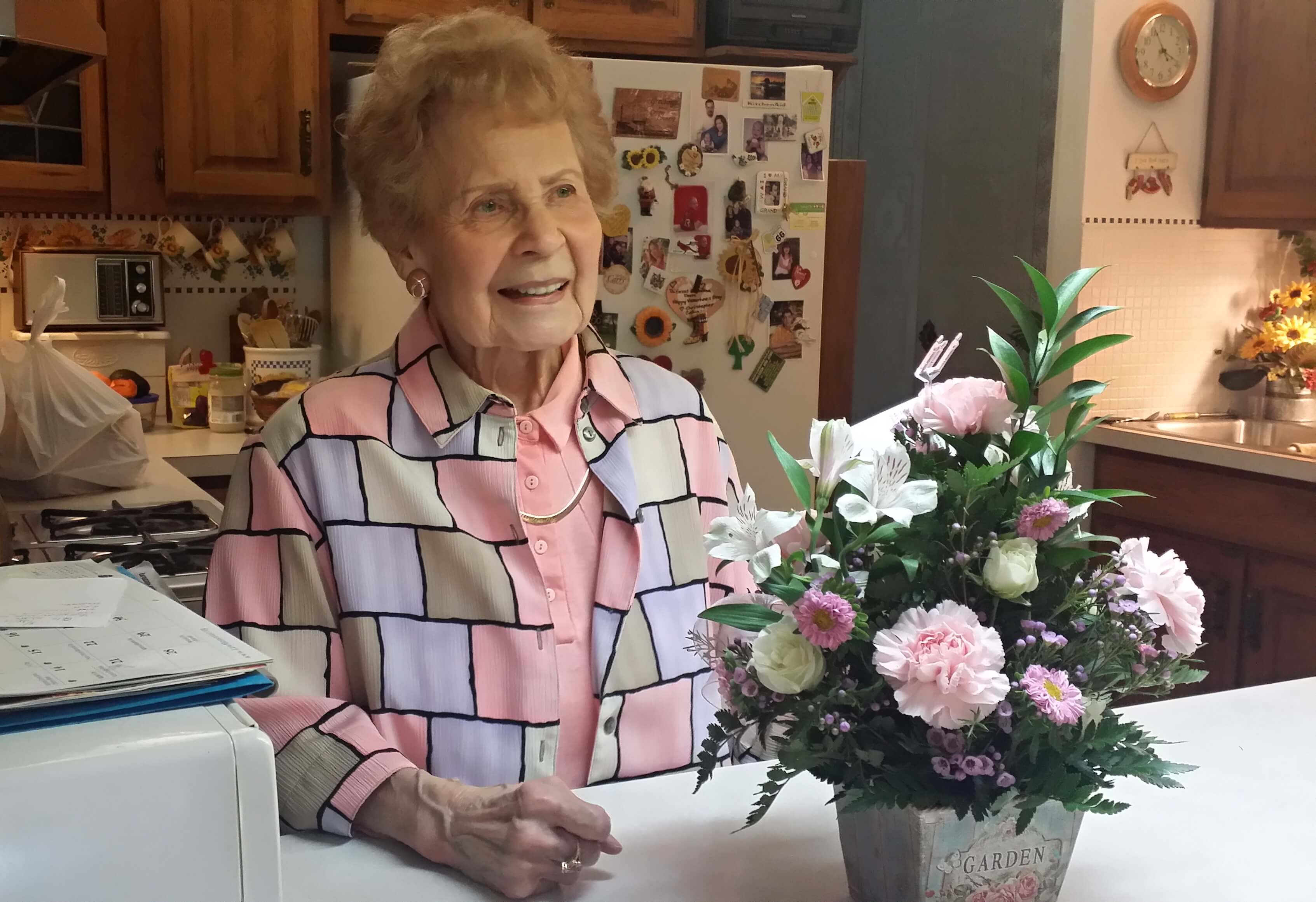
Saima Davis has not been diagnosed with dementia but has been having memory issues, her daughter says. Photo courtesy of the Davis family.
Saima Davis
Age
98
Lives in
South St. Louis County
Condition
Unknown
Carol Davis McDonald said the family had not taken her mother, Saima (pronounced SIGH-muh) Davis, to a neurologist for a diagnosis of dementia, "but we feel that there has been a significant change in her cognition since her surgery in May."
Sometimes, her daughter writes, she forgets things she has been told five times. But sometimes she remembers. "Some days are good, and some aren't. Usually, evenings are worse than earlier in the day, but not always."
Her mother is 98, Davis McDonald said.
Her anxiety level seemed higher in the past few years, her daughter said. She doesn't want to have company anymore, other than a few people at a time, as it makes her nervous.
Davis was a stay-at-home mother until her youngest son started school. Then she worked part time at several jobs.
She and her husband and friends went dancing on Saturday nights, and she loved to travel. Health and nutrition became her passions. "She was always telling people to do their own research to treat problems with something other than drugs," her daughter wrote.
Davis McDonald's advice:"I have tried to let my mother help with decisions regarding her living quarters," Davis McDonald wrote."We are fortunate that my parents signed up for LTC insurance in the '80s, but no cost-of-living adjustment was included. Hopefully, we won’t run out of money before she suggests selling her house."

Sylvia and Samuel Zaidenberg both had dementia. Their daughter, Janet Zaidenberg-Schrum, moved to Arizona to look after them for nine years. Photo courtesy of the Zaidenberg family.
Samuel Zaidenberg and Sylvia Zaidenberg
Age
96 and 85
Condition
Mixed dementia
Died
2007 and 2004
Janet Zaidenberg-Schrum was caregiver for her parents, who both developed dementia.
"The first signs," she wrote, "were short-term memory loss and confusion about things (such as where they were) and events (where, when and why). Additional signs were increased confusion without a specific cause. This confusion created anxiety, which resulted in more confusion — it was a vicious circle of increasing mental and cognitive impairment."
Zaidenberg-Schrum, who lives in St. Louis, moved to Tucson, Ariz., to help look out for them.
She said her mother showed symptoms in her early to mid-70s. Her father's symptoms began in his 80s.
Samuel Zaidenberg was a physician in Chicago. Sylvia was a stay-at-home mom who played competitive bridge. They loved opera and traveled to see it.
Zaidenberg-Schrum's advice includes providing as much detail as possible to doctors, reading about dementia and participating in support groups.
Caregivers need "to take care of themselves and their needs. If they do not, they will become overwhelmed or worse (depression and other health issues are very common)."
Zaidenberg-Schrum said she was lucky because her parents had the resources to pay for their care. She managed their affairs for nine years.
The experience was both satisfying and painful, she wrote. "Watching them disappear as the adults I had known all my life was extraordinarily difficult. … But I also had many wonderful moments of love and grace with my parents that I would never have had without looking after them as I did."
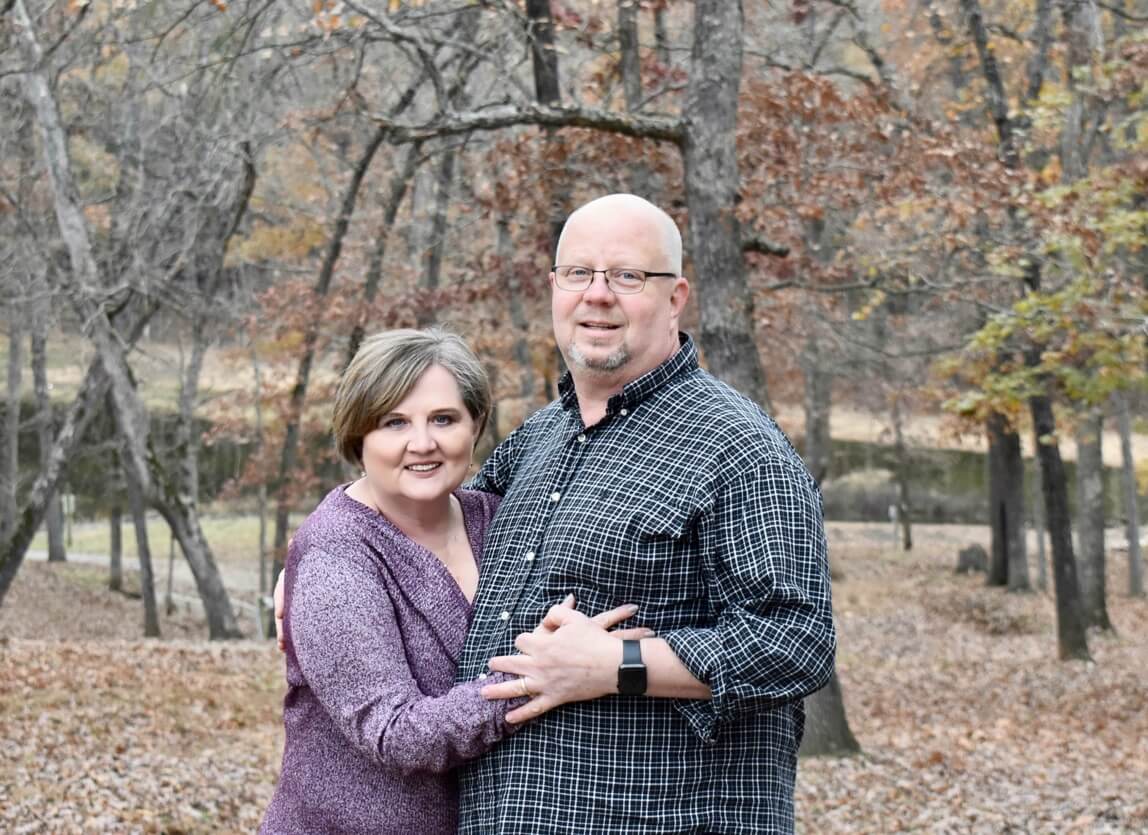
Terri Walker and her husband, David. She took care of him after he had a major stroke in 2008. He is now her advocate as she deals with early onset Alzheimer's. Photo courtesy of the Walker family.
Terri Walker
Age
55
Lives in
Jefferson City
Condition
Early onset Alzheimer's
Terri Walker says she noticed around two years ago that she was repeating herself, struggling to find words, and losing and forgetting things. She thought it was a reaction to the death of her son, killed when a dump truck ran a stop sign, two days before his baby was born.
She talked to her neurologist, who thought the problems might be due to her migraine medicine. Finally, this year, Walker was tested.
She got the diagnosis on May 31: early onset Alzheimer's. Walker was 54.
"It was devastating," she wrote. "I was diagnosed on my grandson's 7th birthday. I had to put on a smile and try to pretend everything was OK, when all I wanted to do was throw up, looking at all my family's faces and think that someday I will not know them."
Walker offers this advice:"Please do not ignore the symptoms and signs. Push your family to be your advocate. My husband had to be mine. Get your doctors to listen, if they do not, find one that will."
She said she is having balance problems and has fallen. She is trying to eat well and walk every day. She also bowls, takes care of her grandson and volunteers at the school, although she has given up a role that required working on a computer. It was too stressful, she said.
Walker and her husband, David, are no strangers to health challenges. David had a major stroke in 2008 and had to relearn how to walk and talk.
After her diagnosis, Walker started a team for an Alzheimer's fundraising walk. She thought she could raise a few hundred dollars. She raised more than $4,000.
People tell her that she doesn't look like she has Alzheimer's, she said. "What am I supposed to look like? They don't see the struggles. I have to write everything down, write reminders on my phone. Everything is a struggle."
But she perseveres.
"I am determined to fight this with everything I have. I have ALZ, but it does not have me," Walker wrote.
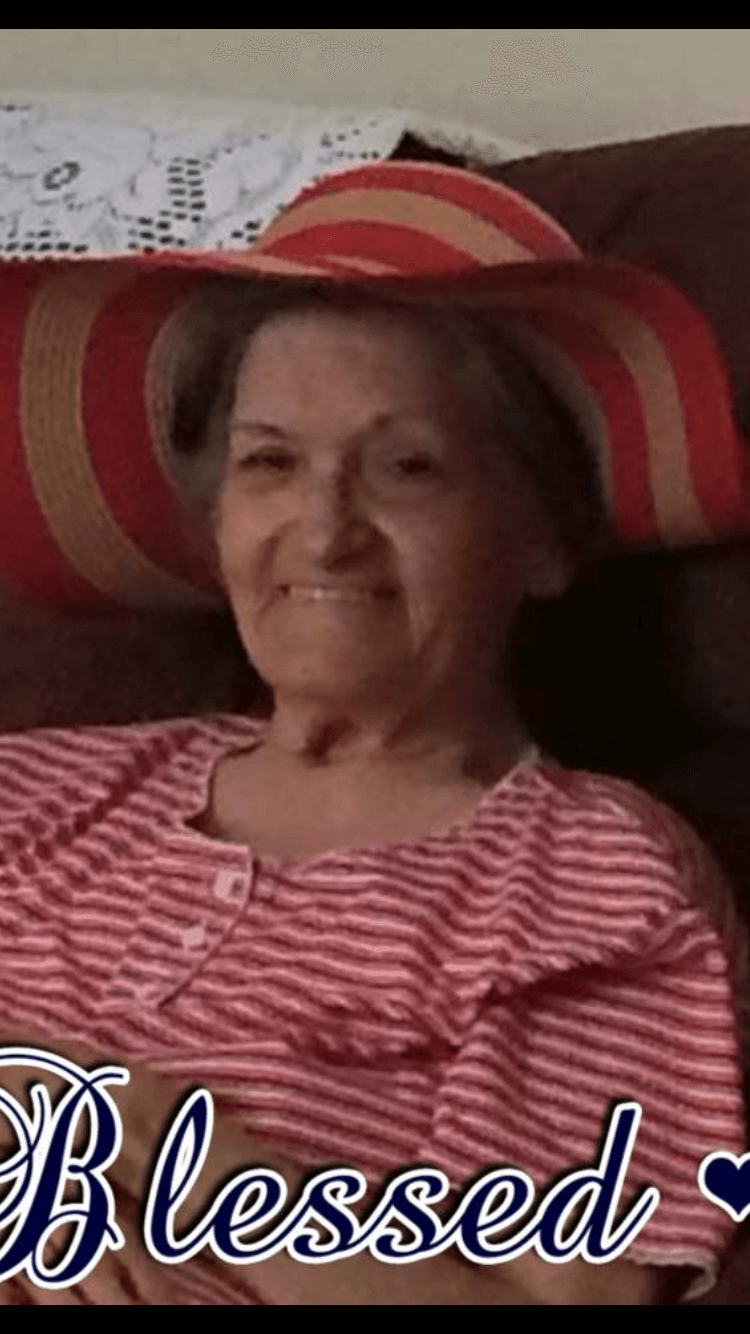
Willa Overton of O'Fallon, Mo., has Alzheimer's disease and is being cared for at home. “Just be loving and kind,” says her son, Dave Overton. Photo courtesy of the Overton family.
Willa Overton
Age
83
Lives in
O'Fallon, Mo.
Condition
Alzheimer's
Willa Overton worked as real estate agent in the '70s and as a school cook in the '80s and '90s in the Fort Zumwalt School District, according to Dave Overton, the youngest of her four children.
“She was a great cook and a great gardener,” he said.
Dave Overton helps his dad care for his mom in their home, where she is receiving hospice care. His mom was diagnosed with Alzheimer's in 2010, and she hasn't uttered his name in seven years.
“When I wash her hair and brush her hair or wash her face, I say, 'How was that?' And she says, 'Oh, you're a good guy,'” Dave Overton said. “I'm just a good guy that helps her.”
He said that reducing her medications and taking natural supplements like turmeric and coconut oil helped her alertness and health.
She can't walk and is “skinny down to the bone,” her son said. She tightens her lips and bats your hand away if you try to feed her, he said, but she likes pudding and ice cream. She's constantly scared.
“Just be loving and kind,” Dave Overton advises caregivers, and find things they enjoy. His mom still loves music and singing.
“It's incessant. It's constantly understanding and repeating yourself,” he said. “It's like having an 83-year-old 2-year-old.”
But Dave Overton insists on helping.
“She gave birth to me,” he said, “and took me to all my piano lessons and trumpet lessons and baseball games.”
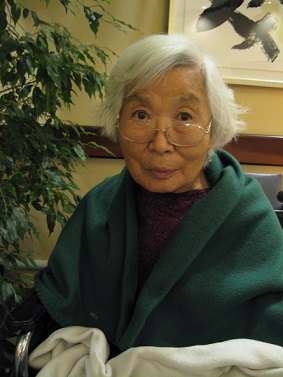
Yaeko Weldon was diagnosed with Alzheimer's in 2006. Photo courtesy of the Weldon family.
Yaeko Weldon
Lived in
St. Ann
Condition
Alzheimer's
Died
2015
Linda Austin says she first noticed problems while writing a memoir about her mother, Yaeko Weldon, who was a 16-year-old living in Japan when Pearl Harbor was attacked. Her mom, she said, was repeating herself constantly, misplaced things and "began forgetting and contradicting what she had told me many times before."
A neurologist diagnosed Alzheimer's in 2006. Weldon was 81.
"That was her biggest fear — having dementia," Austin said.
For a while, Weldon continued to live in St. Ann, and a friend looked in on her regularly. Eventually, Austin moved her closer to her own home so she could visit every day. Around 2009, Austin moved her into a nursing home.
Moving her into a facility helped, because "it wasn't her daughter trying to boss her around," Austin said.
Austin's advice for family members is to "take the Alzheimer's Association classes and read all you can about this disease and how to work with the person afflicted by it. I learned so much about why my mother behaved as she did and how to deal with that."
Caregivers, Austin wrote, need patience and understanding, but they also need to give themselves a break when they are overstressed.
"Caregiving for Alzheimer's patients is extremely stressful mentally, and can even affect the caregiver's physical health. It can destroy families. Understand the person with Alzheimer's is often fearful and stressed and acting on that."
Weldon had two daughters and was an excellent seamstress and tailor. "She could sew anything without a pattern," Austin said.
She also loved gardening, painting, crafts and walks. "She was quite artistic and creative," her daughter said.
Questions
We're interested in hearing from readers who are living with dementia, or caring for someone with dementia. As with any conversation, keep comments polite and refrain from personal insults, foul language or off-topic remarks.
Read more about our commenting guidelines.
About this series

Michele Munz has been a reporter for the St. Louis Post-Dispatch for 20 years, the past nine covering health and medicine. As a health reporter, Munz has won awards for her coverage of midwifery care, an experimental treatment for ALS and the opioid epidemic. She was the St. Louis Newspaper Guild’s 2015 Terry Hughes Award winner.

Christian Gooden has been with the Post-Dispatch since 1999. He is a native of University City and graduate of Cardinal Ritter College Preparatory High School. He earned a degree in journalism from Morehouse College in Atlanta, Ga. He has worked at The Atlanta Journal-Constitution and the Milledgeville (Georgia) Union-Recorder.

Cristina M. Fletes is a staff photographer and videographer at the St. Louis Post-Dispatch. She received a bachelor of fine arts degree in studio art from Louisiana State University in Baton Rouge and a master's degree in photojournalism from the University of North Carolina at Chapel Hill.
Andrew Nguyen
Developer
Josh Renaud
Developer
Beth O'Malley
Audience engagement
Elaine Vydra
Audience engagement
Janelle O'Dea
Data reporter
Hillary Levin
Multimedia producer
Gary Hairlson
Multimedia director
Jean Buchanan
Projects editor
Evan Hill
Print designer
Jennie Crabbe
Copy editor
June Heath
Copy editor
Colleen Schrappen
Copy editor